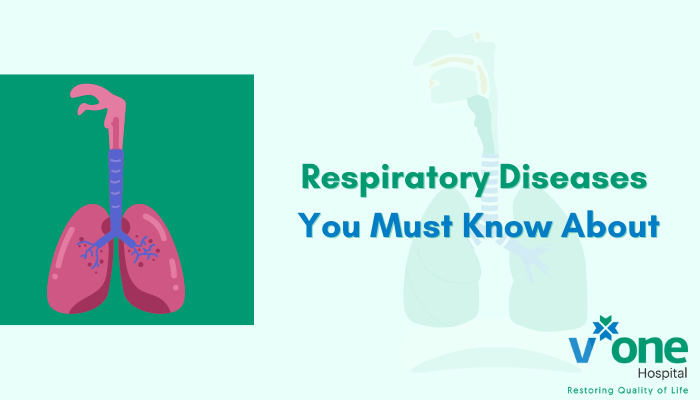5 Most Common Respiratory Diseases You Need to Know About
Before 2020 came around, our knowledge of the term “respiratory disease” was limited to the likes of asthma and the common cold. But with everything we have gone through over the past few years, we can’t help but pay attention.
Whether you’re seeking information for yourself or just looking to expand your vocabulary on the topic, here are 5 of the most common respiratory diseases you need to know about.
1. Chronic Obstructive Pulmonary Disease (COPD)
COPD is a chronic inflammatory lung disease that blocks airflow and makes it harder to breathe. The damage it causes to the lungs is irreversible. The two main forms of COPD are Chronic Bronchitis and Emphysema.
Causes
COPD is mainly caused by smoking and it can increase the risk. Genetics and exposure to certain gasses, fumes, pollution, and secondhand smoke can also cause it.
Symptoms
COPD can cause cough with/without mucus, wheezing, fatigue, and shortness of breath.
Treatment
While COPD can’t be cured, to manage the symptoms, you can stop smoking, undergo Bronchodilator Therapy or Pulmonary Rehabilitation, or take long-term antibiotics or certain quick-relief, control, or anti-inflammatory drugs.
2. Emphysema
Emphysema is a severe type of COPD and causes shortness of breath. This respiratory disease can damage the air sacs in the lungs and the walls between the air sacs, leading to larger and fewer air sacs, making it harder to breathe. Ultimately, it can lead to respiratory failure.
Causes
Again, the most common cause here is smoking. Tobacco damages the air sacs in such a way that they can no longer repair themselves. Exposure to secondhand smoke, pollution, and chemical fumes or dust can also cause it. Emphysema can also be genetically inherited.
Symptoms
Emphysema can cause chronic cough, shortness of breath, wheezing, fatigue, a whistling sound when you breathe, tightness in your chest, headaches, loss of appetite, anxiety, and insomnia.
Treatment
Emphysema cannot be cured, but various treatments can help with the symptoms and slow the progress of the disease. Treatment options for this respiratory disease include certain medicines (bronchodilators, antibiotics), oxygen therapy, pulmonary rehabilitation, surgery, lifestyle changes, quitting smoking, and exercise.
3. Lung Cancer
Smoking too much can cause lung cancer, which is when the cells in the lungs start dividing uncontrollably and tumors start to grow. While it begins in the lungs, it can spread to the lymph nodes, bones, brain, and liver.
Causes
The main cause of lung cancer is smoking, but inhaling a harmful chemical for a long time can also cause cellular damage and then lead to lung cancer. Other common causes include exposure to secondhand smoke, previous radiation therapy, and exposure to Radon gas, asbestos, Uranium, Nickel, Chromium, Cadmium, or Arsenic.
Symptoms
Lung cancer can cause cough, wheezing, shortness of breath, fatigue, weight loss, and chest pain when you laugh or cough.
Lung cancer is also the leading cause of cancer deaths around the world.
Treatment
The treatment options for lung cancer include surgery, chemotherapy, immunotherapy, radiotherapy, targeted drug therapy, and radiation therapy. Things like yoga, acupuncture, hypnosis, meditation, and massage.
4. Pneumonia
Pneumonia is one of the respiratory diseases that causes inflammation in one or both air sacs, and then they may fill up with fluid.
Causes
It can be caused by a variety of bacteria, viruses, and fungi in the air we breathe.
Symptoms
Pneumonia can cause a person to develop a fever and cough with mucus. It can also cause nausea, sweating, chest pain during coughing or laughing, headache, and loss of appetite.
Treatment
Pneumonia can be treated with antibiotics, oxygen therapy, respiratory therapy, aspirin, and ibuprofen.
5. Pleural Effusion
Pleural effusion is when fluid builds up between the tissues lining the lungs and the chest. When the lungs are damaged through inflammation, irritation, or infection, the pleura (the lining that cushions the lungs) creates too much fluid.
Causes
Heart failure is the most common cause of pleural effusion, but it can also be caused by lung cancer, breast cancer, ovarian cancer, leukemia, melanoma, pneumonia, poor liver function, kidney disease, and autoimmune diseases.
Symptoms
Pleural effusion can cause dry coughing, fever, sharp pain in the chest, hiccups, and shortness of breath.
Treatment
This condition can be treated by draining the fluid from between the lungs and the chest cavity through surgery of Pleurodesis. Other options include antibiotics and water pills (diuretics).
Prevention of Respiratory Diseases
As we all know by now, the best way to prevent catching a respiratory disease is to avoid contact with droplets of saliva, mucus, and tears, wash your hands often, and minimize contact with people who are coughing or sneezing. If you smoke, you should quit. Additionally, you need to avoid exposure to indoor and outdoor pollutants. Get vaccinated and exercise to keep things going smoothly. By staying healthy, you’ll be able to recover faster even if you do happen to catch it!

